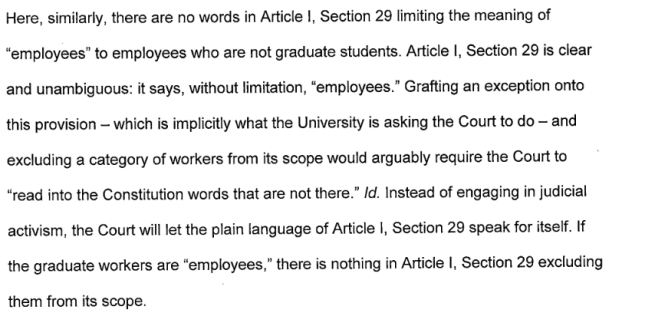
On June 21st, AFT announced that an agreement had been reached between Stand Up for Graduate Student Employees (SUGSE) and their employers for a union election away from the National Labor Relations Board. The agreement comes after a year of negotiations with their employer and two and a half years of getting the majority of their bargaining unit onto cards. I won’t rehash what I’ve already written about this agreement, but it is important to emphasize the role of public pressure and direct action in moving employers to recognize and negotiate with unions in higher ed.
Also last Thursday, a judge ruled against the University of Missouri, which has spent three years challenging its graduate employees in as to whether or not they were actually employees. It’s worth smiling at this paragraph especially:

The University of Missouri had denied an election to graduate workers twice over the course of a year. After the second denial, the Coalition of Graduate workers held an election with the assistance of the League of Women voters, in which 84% voted for union representation (30% of the bargaining unit participated). The judge not only held that Missouri’s graduate workers were workers, but also that the University of Missouri waived its right to contest the vote when it refused an election to their workers. You can read the decision here.
On Thursday, Western Illinois University announced their intention to lay off 24 faculty members, including 7 with tenure. In addition, 62 vacant faculty positions will be eliminated entirely. These eliminations were part of a charge handed down from the Board of Trustees to line up Western Illinois with the reduction of funding and declining enrollments they have seen, its president going so far as to say that “Western Illinois can no longer be all things to all people.” Their announcement also suggested they hoped public funding from the state government in Illinois would return in the next few years to aid the deficit WIU is facing. Given the billionaire race between JB Pritzker and Bruce Rauner for the Governor’s seat, this hope seems more fantasy than reality.
Early Friday morning, a Portland State University police officer murdered Jason Washington, a postal worker and father to three daughters. He was trying to break up a fight, when his own holstered gun dropped, and the police opened fire when he went to pick it up.
Firearms aside, it is a fact that the Board of Trustees at Portland State University voted to arm police officers in 2015, against the recommendations of students and the faculty and graduate student members of the Board of Trustees. The strongest argument made in that debate appeared to be retaining school control over armed police officers, as opposed to retaining the Portland Police Bureau. In any case, the ten new armed officers are costing the university about $1.2 million a year. If you’re interested, check out this plan for the implementation of these armed police officers.
On Wednesday, full and adjunct faculty and postdocs at Oregon State University announced that they had successfully unionized after years of organizing. The 2,400 individuals represented by the new AFT-AAUP affiliated union represent faculty at the Corvallis campus, the Bend and Newport campuses, and even faculty who teach primarily online. The news was especially welcome on the same day that the Janus decision brought Right-to-work policy to the public sectors throughout the United States.
I’ve evaded discussion of Janus because I think lots of folks are doing far better with it than me. Chris Maisano for Jacobin wrote an excellent essay that describes Janus as opening the door for a more militant labor movement than the sort of backroom negotiations and civil discourse that has dominated unions and labor since Clinton. As part of this perspective, I’ll be putting out a discussion with some organizers and members with UAW4121 about their strike action sometime this week.
Incidentally, if you’re looking for a change in career, California is seeking two full-time organizers with salaries starting at $62k; more info here.